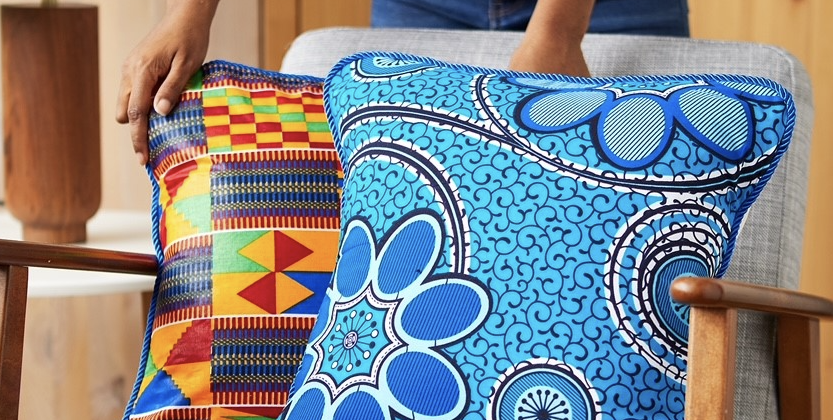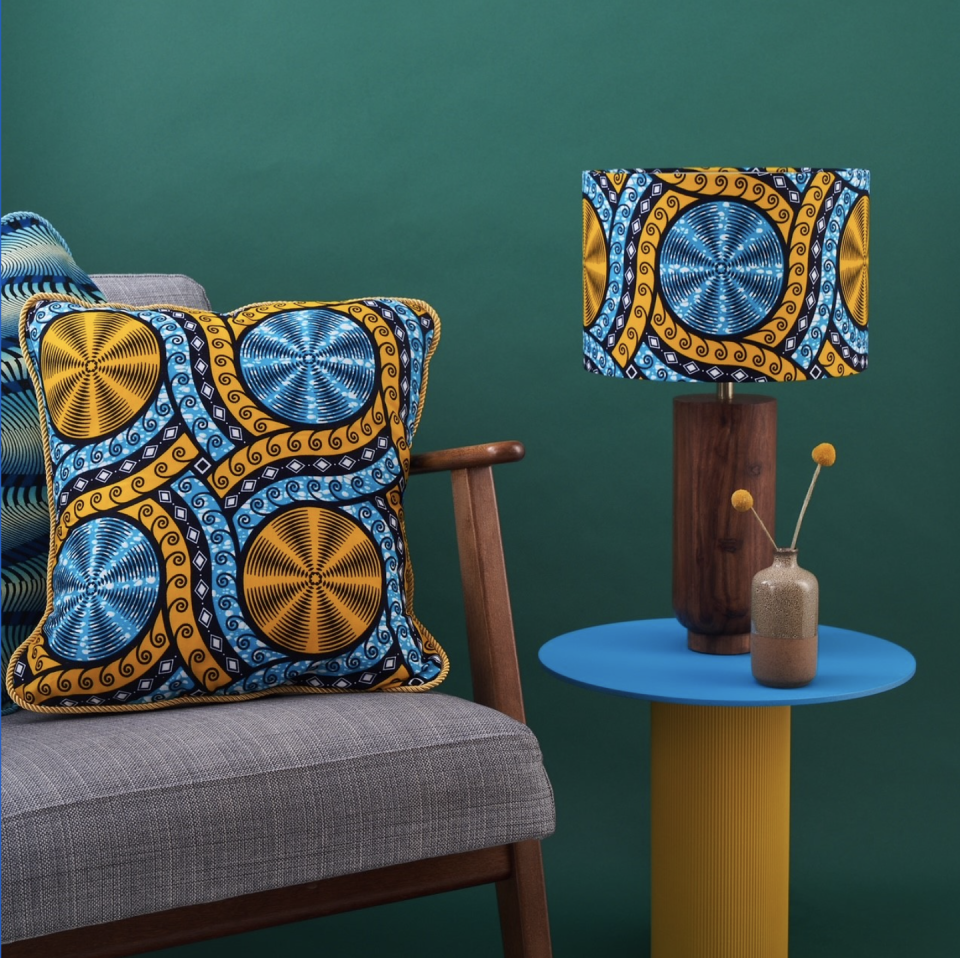How Bespoke Binny Makes Eclectic Homeware From West African Cloth

"Hearst Magazines and Yahoo may earn commission or revenue on some items through the links below."
Shop Small is a bi-weekly series highlighting small business owners from diverse backgrounds. This series aims to go deeper than your typical product roundup, diving into the inspirational stories behind some of our favorite brands. By taking a behind-the-scenes look at how their shops came to be and highlighting the products they (and their shoppers!) love, we hope to put a deserving spotlight on these marginalized business owners.
"I need a hobby." Natalie Manima, 36, laughs now when she talks about making this semi-exasperated, mostly-exhausted proclamation to herself a decade ago. But at the time, she was a few years into a career as a practicing CBT therapist, and the erratic work-from-home cycle was taking a toll on her.
"I always wanted to know how to sew," says the London-based entrepreneur, so she signed up for a course. "I was not planning on starting a business at all." Lucky for us, Manima's self-prescribed burnout cure has blossomed into the home decor brand Bespoke Binny — "bespoke" is meant to highlight that Manima's products are made to order, while "Binny" is a nickname coined from her Ghanaian middle name Obenewa.
From vibrant lampshades (her most popular items) and decorative table runners to boldly patterned aprons and oven gloves, Bespoke Binny's colorful African-print creations — all available on her Etsy shop — instantly make any room feel more interesting.
Here, Manima tells us about her journey from budding creator to business owner — and how you can include the bright housewares into your home.
From a (Happily) Slow Build-up to a Sudden Boom
A few months after beginning sewing classes, Manima moved into her first apartment — and was underwhelmed by the decor options she found. "Oh, these colors are really boring," Manima says she thought after browsing through an array of shops full of blue, beige and gray.
So she decided to use some African print fabric she had at home to make cushion covers and lampshades. The reaction from friends who visited was always overwhelmingly positive — followed up with, "'You should sell this." Eventually, she began to do just that: "I kind of bowed to the peer pressure," she jokes. Manima opened her Etsy shop in 2013 and had enough sales to motivate her to keep going. "It's grown organically since."
Around 2016, Manima went part-time with her job as a therapist to allow herself more freedom to create and fill orders, before going full-time with Bespoke Binny in 2019. It wasn't until the pandemic hit that she found herself on what she described as a "rollercoaster," especially after interest in Black-owned businesses was sparked by the Black Lives Matter movement. "I'm finally getting recognized for what I do," Manima says when explaining her thoughts at the time, "but on the flip side, the reason I'm getting recognized felt horrible."
That year, Manima found her small business flourishing to the point where she couldn't fit any of her products or materials in her home. She went from getting around 30 to 40 orders a day, to "[waking] up to like, 2,500 orders — it was insane —" which left her having to pay for office space, all while reaching out to family and friends for help with product-making. She credits her husband with caring for their two young daughters while showing her the ins and outs of running social media ads on Instagram.
Eventually, the boom slowed down and she found herself, "left with all these overheads that I then couldn't afford anymore," admits Manima. "On the one hand, you kind of naively hoped it would make people realize that they don't support Black businesses enough. But it hasn't actually been permanently sustained. It is the same degree of people [as before] continuing to support black businesses."
"It's like, so was it a bit of a fad? There are still black businesses that need support long after the fan fare has died down."
The Beauty of African Expression for Everyone
"In Ghana," where Manima's family originally hails from, "people wear these fabrics every day. But when in western countries, it's more[for] going to an event — to a party, a wedding, things like that. I was thinking I'd love to find a way for it to be incorporated into everyday life."
Although Manima hasn't visited Ghana in years, she stays connected by having prints shipped directly from the country's manufacturers and markets. "Sometimes you'll go to a shop and you won't know whether [the fabrics] come from Africa, and the proof is sometimes in the pudding — when you go to wash it, the colors may run," Manima says. "You have to be quite careful about your sourcing. It's getting harder and harder to differentiate."
And if you're just getting acquainted with African prints and wondering how to incorporate them into your home, Manima makes it easy: start with what speaks to you then look to coordinate. "There are people who accidentally come across me who didn't even know what they're seeing is an African print. They're just drawn to the bright colors and the interesting patterns. If you are into interiors and like bright colors, consider buying a product that fits with [your] color schemes."

Lessons Learned as an Entrepreneur
Ask for help.
Don't be afraid to admit when you need a helping hand. Sick during her first pregnancy, Manima knew she couldn't create products on her own. She sourced a manufacturer, hoping they could replicate her items — even when she requested smaller amounts than they'd usually agree on.
"They probably felt a bit sorry for this waddling pregnant woman," she jokes. "I just had to be persistent and eventually, I found someone who was willing to do what I needed."
Don't be afraid of conflict.
"In business, there is always a problem, but then there is always a solution," says Manima, who stresses the importance of being persistent. "Just putting one foot in front of the other and trying to be consistent goes a long way to eventually getting to where you need to go."
Stay the course.
If Manima could give one piece of advice to aspiring business owners, especially from her viewpoint as a Black woman: "Live in your truth. If you're passionate about something, stick to it, and don't be swayed from your path."
You Might Also Like

